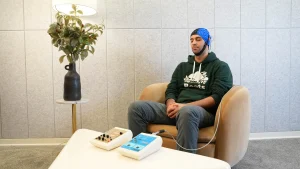Welcoming a new baby is often portrayed as one of the happiest moments in a woman’s life. While there’s no doubt that the arrival of a newborn can bring immense joy and love, it can also usher in a range of complex emotions, from overwhelm to anxiety. For some women, these emotions evolve into a serious condition known as postpartum depression (PPD). Understanding PPD—its symptoms, causes, and treatment options—can empower new moms and their loved ones to seek timely help and support.
Understanding Postpartum Depression
Postpartum depression is a mood disorder that can affect women after childbirth. It’s more than just the “baby blues”—the mild sadness, worry, or fatigue many mothers experience in the days or weeks after delivery. While the baby blues typically subside within two weeks, postpartum depression is more intense, lasts longer, and can significantly interfere with daily life.
Postpartum vs. Baby Blues vs. Postpartum Psychosis
- Baby Blues: Emotional ups and downs, mood swings, and tearfulness that usually peak a few days after birth and taper off within about two weeks.
- Postpartum Depression (PPD): Intense feelings of sadness, anxiety, or despair that persist longer than two weeks and often worsen over time without professional help.
- Postpartum Psychosis: A rare, severe condition that includes hallucinations, delusions, extreme mood swings, and confusion. This is a medical emergency requiring immediate attention.

Symptoms of Postpartum Depression
While postpartum depression can look different for everyone, common symptoms include:
- Persistent Sadness or Guilt
Feeling deeply sad or empty, along with persistent guilt. - Loss of Interest or Pleasure
Losing interest in activities once enjoyed, including bonding moments with the baby. - Changes in Appetite or Sleep
Insomnia or difficulty sleeping (despite feeling exhausted), oversleeping, or drastic changes in appetite. - Exhaustion and Low Energy
More than the usual newborn-related fatigue; tasks can feel overwhelming. - Anxiety and Irritability
Constant worry about the baby’s well-being, coupled with feeling easily agitated or frustrated. - Feelings of Inadequacy
A pervasive sense of “I’m not good enough” or “I’m failing as a mother.” - Difficulty Concentrating
Struggling with focus and decision-making can add extra stress. - Thoughts of Harming Oneself or the Baby
Intrusive or disturbing thoughts, which may be accompanied by a sense of panic or fear. If this occurs, seek help immediately.
Risk Factors
Several factors increase the likelihood of postpartum depression:
- History of Depression or Anxiety: A personal or family history of mood disorders raises the risk.
- Hormonal Changes: Post-birth drops in estrogen and progesterone can significantly affect emotional stability.
- Lack of Support: Feeling isolated or having an unsupportive partner/family can worsen symptoms.
- Stressful Life Events: Financial or relationship problems, or other major life changes around childbirth.
- Pregnancy or Birth Complications: Difficult pregnancies or traumatic birth experiences can increase vulnerability.
- Sleep Deprivation: Fragmented rest makes it harder to manage stress and emotional swings.

When to Seek Help
It’s critical to recognize when normal emotional shifts become something more. You should seek help if:
- Symptoms Persist Beyond Two Weeks
If mood swings and sadness don’t improve—or worsen—after two weeks. - Daily Functioning Is Impaired
Difficulty performing tasks necessary for self-care or baby’s care. - Intense Feelings of Hopelessness
Persistent or overwhelming feelings of hopelessness or anxiety. - Harmful or Intrusive Thoughts
If you experience thoughts of harming yourself or your baby, reach out to a mental health professional or emergency services immediately.
Treatment and Support
The good news is that postpartum depression is treatable, and many women find relief through comprehensive care and support. Here are some proven methods to consider:
- Therapy
- Cognitive Behavioral Therapy (CBT): Helps identify and modify harmful thought patterns, creating healthier coping strategies.
- Interpersonal Therapy (IPT): Focuses on strengthening communication and relationships that may affect emotional well-being.
- Medication
- Antidepressants: Can help regulate brain chemistry. Some are considered safe during breastfeeding, but always consult your doctor about potential risks and benefits.
- Neurofeedback, Biofeedback, and Photobiomodulation (PBM)
- Neurofeedback: Uses real-time displays of brain activity to teach self-regulation and improve mood.
- Biofeedback: Helps you understand and control physiological responses like heart rate or muscle tension, reducing stress and anxiety.
- Photobiomodulation (PBM): A non-invasive therapy using light to stimulate cellular function, potentially aiding in mood stabilization and stress reduction.
- Hormone Therapy
- Estrogen Therapy: In certain cases, balancing hormones post-childbirth may stabilize mood and reduce PPD symptoms.
- Lifestyle Adjustments
- Adequate Sleep: Arrange shifts with partners, friends, or family to ensure you get consistent rest.
- Balanced Diet: Nutrient-rich foods help stabilize energy levels and mood.
- Gentle Exercise: Walking, postpartum yoga, or light stretching can support emotional health.
- Stress Management: Techniques such as mindfulness, guided relaxation, and journaling can ease anxiety.
- Support Networks
- Peer Support Groups: Connecting with other mothers who have experienced PPD can provide camaraderie and reassurance.
- Family and Friends: Encourage loved ones to help with household chores or babysitting to give you time to rest and heal.
- Professional Postpartum Support: Local and online resources dedicated to maternal mental health can be invaluable.

Tips for Partners, Family, and Friends
- Offer Practical Help: Simple tasks like cooking, laundry, and errand-running can be a big relief.
- Listen Without Judgment: Create a safe space for new moms to express fears and frustrations.
- Encourage Professional Support: Gently prompt seeking professional help if symptoms are persistent or severe.
- Celebrate Small Victories: Acknowledge every step toward improvement, no matter how small.
Moving Forward with Compassion and Hope
Postpartum depression can be a scary and isolating experience, but it is treatable. With the right blend of professional help, supportive relationships, and evidence-based treatments—ranging from therapy and medication to Neurofeedback, Biofeedback, and PBM—new moms can overcome PPD and rediscover joy in motherhood.
If you or a loved one is experiencing symptoms of postpartum depression, know that help is available. Reach out to a healthcare provider, counselor, or mental health clinic as soon as you can. Early intervention can make a significant difference in recovery, allowing you to fully embrace the precious moments of motherhood.
Remember: Your well-being matters, and asking for help is a sign of strength, not weakness.
Elumind Centres for Brain Excellence is an integrated mental health center offering solutions that can help you with your mental/brain health needs. To start your journey, book your FREE 15-MINUTE PHONE CONSULTATION. We are here for you.








